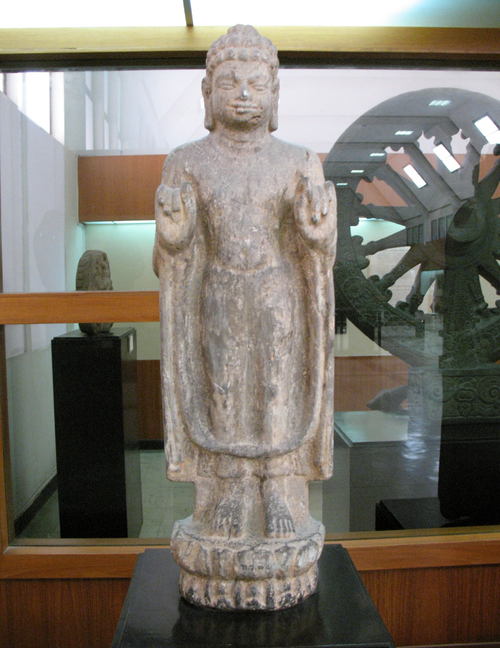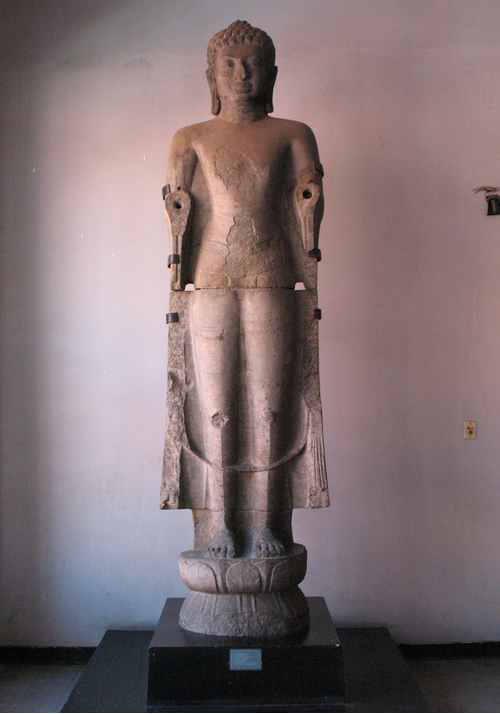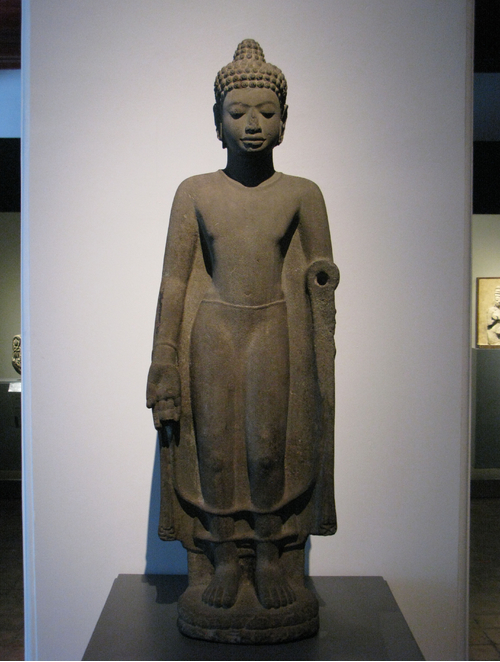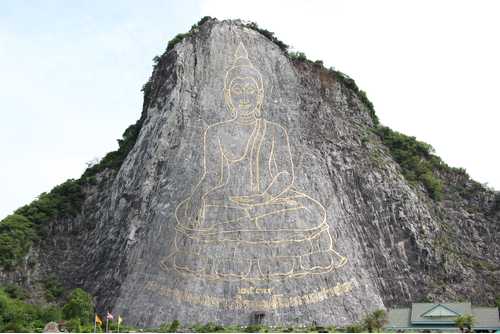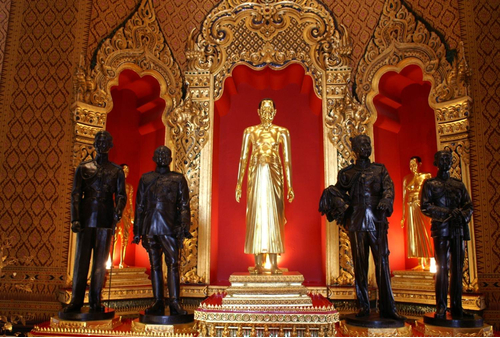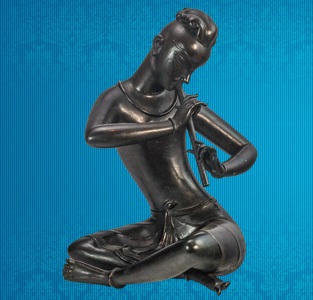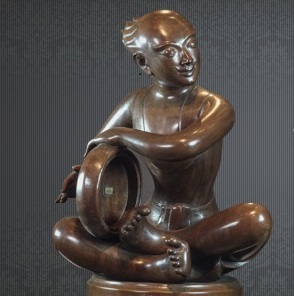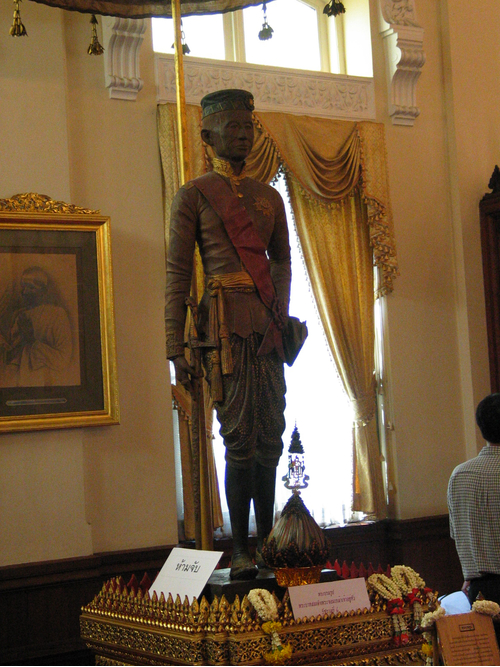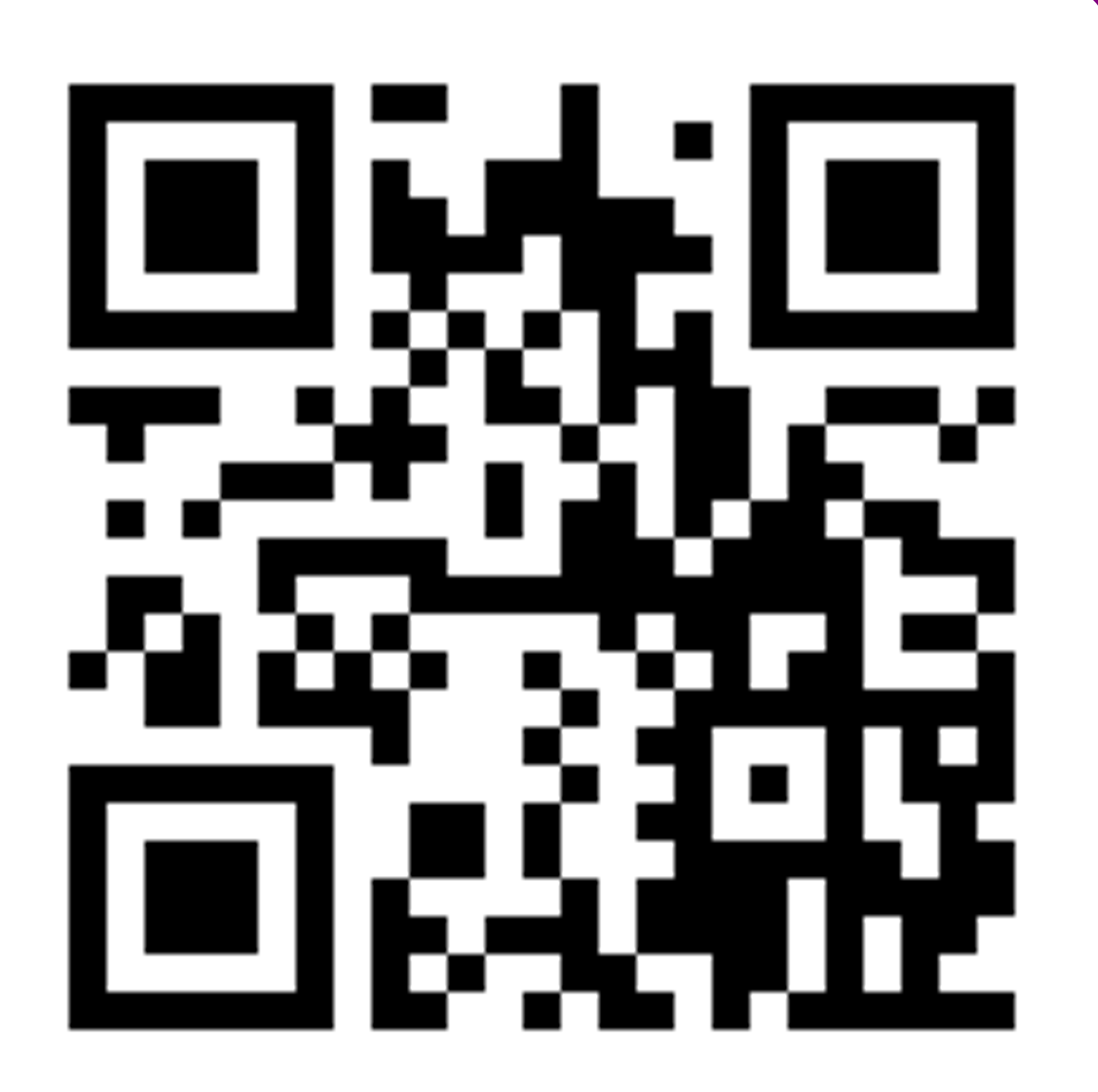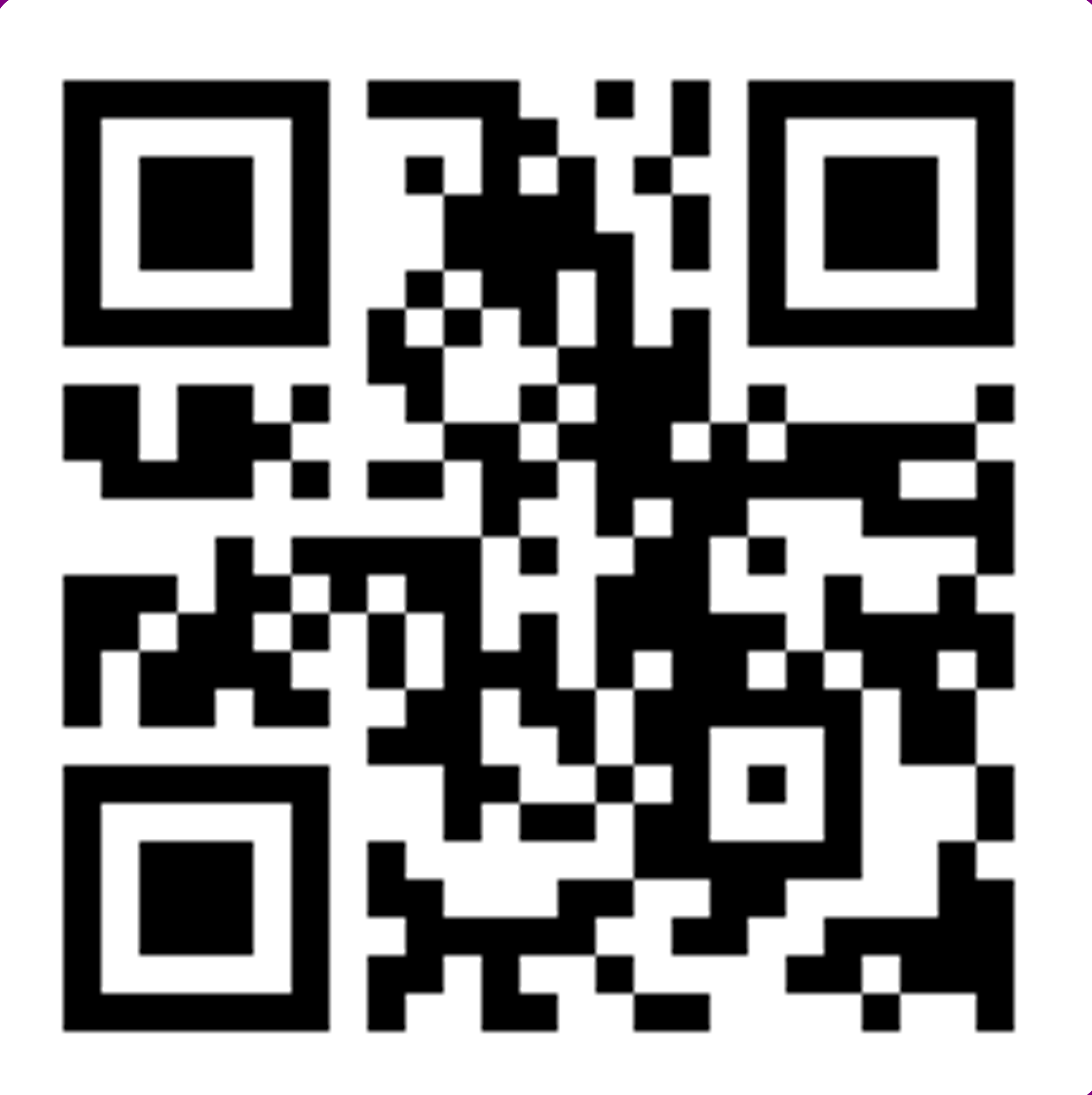ค้นหางานศิลปกรรม
ฐานข้อมูลศิลปกรรมในเอเชียตะวันออกเฉียงใต้
ประติมากรรมพระพุทธรูปปางแสดงธรรม
พระพุทธรูปองค์นี้อยู่ในอิริยาบถยืนตรงบนฐานบัวคว่ำบัวหงาย สลักขึ้นจากหินก้อนเดียวซึ่งเป็นกรรมวิธีการทำพระพุทธรูปหินที่มีขนาดไม่ใหญ่มากในศิลปะทวารวดี พระพักตร์เหลี่ยม พระขนงต่อกันเป็นปีกกา พระเนตรเบิกโพรง พระนาสิกใหญ่ พระโอษฐ์แบะ พระกรรณยาว ขมวดพระเกศาเวียนเป็นวงก้นหอย พระอุษณีษะนูนสูงเด่น เดิมทีน่าจะเคยมีพระรัศมีที่ทำจากอัญมณีมีค่าแต่ได้สูญหายไปแล้วพระพุทธรูปครองจีวรห่มคลุม ไม่มีริ้ว บางแนบเนื้อราวผ้าเปียกน้ำจนเห็นพระพุทธสรีระและขอบสบงที่บริเวณบั้นพระองค์ชัดเจน ชายจีวรด้านหน้ายกสูงพาดผ่านพระชงฆ์เป็นรูปวงโค้ง ชายจีวรด้านหลังยาวเป็นกรอบสี่เหลี่ยม เห็นชายสบงอยู่ตรงกลางระหว่างจีวรด้านหน้ากับด้านหลัง พระหัตถ์ทั้งสองข้างยกขึ้นสูงระดับพระอุระ แสดงปางประทานธรรมหรือวิตรรกมุทราแบบงอนิ้วพระหัตถ์ (บางท่านเรียกว่า อาหูยมุทรา) หากมองจากด้านข้างจะพบว่าพระกรช่วงล่างตั้งแต่พระกโปตะ (ศอก) จนถึงพระหัตถ์สั้นผิดส่วนและแนบชิดพระพาหา (ต้นแขน) โดยมีชิ้นหินที่ไม่ได้สกัดออกยึดตรึงระหว่างกัน รทำเช่นนี้คงเกิดขึ้นจากหินที่นำมาใช้มีความหนาไม่เพียงพอที่จะสลักช่วงพระกรให้ยาวออกไป และต้องการให้พระกรคงทนไม่หักง่ายจึงต้องยึดตรึงกับพระพาหาพระบาททั้งสองรองรับด้วยฐานสลักกลีบบัวคำว่ากลีบบัวหงาย ไม่สกัดหินบริเวณข้อพระบาทออก เป็นกรรมวิธีรับน้ำหนักที่พบได้ในประติมากรรมศิลปะทวารวดีอันมีต้นแบบอยู่ในศิลปะคุปตะของอินเดีย
ประติมากรรมพระพุทธรูป
พระพุทธรูปองค์นี้อยู่ในอิริยาบถยืนตรงบนฐานบัวคว่ำบัวหงาย ใช้หิน 4 ชิ้นประกอบกันเป็นพระพุทธรูปขนาดใหญ่ ชิ้นแรกตั้งแต่พระโสณีลงไปถึงฐานบัว ชิ้นที่สองตั้งแต่พระเศียรลงไปถึงพระโสณี ชิ้นที่สามและสี่ทำพระกรช่วงล่างทั้งสองข้าง การใช้หินหลายก้อนเช่นนี้เป็นกรรมวิธีการสร้างพระพุทธรูปขนาดใหญ่ของทวารวดีพระพักตร์เหลี่ยม พระขนงต่อกันเป็นปีกกา พระเนตรเหลือบต่ำแสดงความสงบ พระนาสิกใหญ่ พระโอษฐ์แบะ พระกรรณยาว ขมวดพระเกศาเวียนเป็นวงก้นหอย พระอุษณีษะนูนสูงเด่นพระพุทธรูปครองจีวรห่มคลุม ไม่มีริ้ว บางแนบเนื้อราวผ้าเปียกน้ำจนเห็นพระพุทธสรีระและขอบสบงที่บริเวณบั้นพระองค์ชัดเจน ชายจีวรด้านหน้ายกสูงพาดผ่านพระชงฆ์เป็นรูปวงโค้ง ชายจีวรด้านหลังยาวเป็นกรอบสี่เหลี่ยมและมีชายทบไปมาแบบที่เรียกว่าเขี้ยวตะขาบ และเห็นชายสบงอยู่ตรงกลางระหว่างจีวรด้านหน้ากับด้านหลัง พระกรทั้งสองข้างเพียงส่วนบนตั้งแต่พระพาหา (ต้นแขน) จนถึงพระกะโประ (ศอก) แลเห็นหลุมวงกลมที่ใช้สำหรับรับเดือยของพระกรท่อนล่างที่หลุดหายไปแล้ว พระบาททั้งสองรองรับด้วยฐานสลักกลีบบัวคำว่ากลีบบัวหงาย ไม่สกัดหินบริเวณข้อพระบาทออก เป็นกรรมวิธีรับน้ำหนักที่พบได้ในประติมากรรมศิลปะทวารวดีอันมีต้นแบบอยู่ในศิลปะคุปตะของอินเดีย
ประติมากรรมพระพุทธรูปประทานพร
พระพุทธรูปปางประทานพรองค์นี้อยู่ในอิริยาบถยืนตริภังค์บนฐานบัวคว่ำบัวหงาย พระพักตร์อิ่ม พระขนงต่อกันเป็นปีกกา พระเนตรเหลือบต่ำแสดงความสงบ พระนาสิกใหญ่ พระโอษฐ์แบะ ขมวดพระเกศาเวียนเป็นวงก้นหอย พระอุษณีษะนูนสูงเด่นพระพุทธรูปครองจีวรห่มคลุม ไม่มีริ้ว บางแนบเนื้อราวผ้าเปียกน้ำจนเห็นพระพุทธสรีระและขอบสบงที่บริเวณบั้นพระองค์ชัดเจน ชายจีวรด้านหน้ายกสูงพาดผ่านพระชงฆ์เป็นรูปวงโค้ง ชายจีวรด้านหลังยาวเป็นกรอบสี่เหลี่ยมและมีชายทบไปมาแบบที่เรียกว่าเขี้ยวตะขาบ และเห็นชายสบงอยู่ตรงกลางระหว่างจีวรด้านหน้ากับด้านหลัง พระกรขวาทอดตัวลงหงายพระหัตถ์ออกด้านหน้า เรียกว่าปางประทานพร พระกรซ้ายเหลือเพียงส่วนบนตั้งแต่พระพาหา (ต้นแขน) จนถึงพระกะโประ (ศอก) แลเห็นหลุมวงกลมที่ใช้สำหรับรับเดือยของพระกรท่อนล่างที่หลุดหายไปแล้วพระองค์ยืนพักพระบาท (พักขา) โดยสังเกตได้จากพระชานุขวาตึง พระขานุซ้ายหย่อน ทำให้พระโสณี (สะโพก) เยื้องไปทางขวามากกว่าทางซ้าย บางท่านเรียกว่ายืนเอียงสะโพก หรือตริภังค์ (เอียงสามส่วน ได้แก่ พระโสณี พระอังสา และพระเศียร) เพียงแต่พระพุทธรูปองค์นี้ทำพระอังสาแลพระเศียรตรง ในขณะที่ต้นแบบในศิลปะอินเดียจะเอียงทั้ง 3 ตำแหน่งชัดเจน พระบาททั้งสองรองรับด้วยฐานสลักกลีบบัวคำว่ากลีบบัวหงาย ไม่สกัดหินบริเวณข้อพระบาทออก เป็นกรรมวิธีรับน้ำหนักที่พบได้ในประติมากรรมศิลปะทวารวดีอันมีต้นแบบอยู่ในศิลปะคุปตะของอินเดีย
ประติมากรรมพระพุทธมหาวชิรอุตตโมภาสศาสดา
พระพุทธรูปประทับขัดสมาธิราบปางมารวิชัย พระพักตร์รูปไข่ พระเนตรเหลือบต่ำ พระนาสิกโด่ง พระกรรณยาว มีอุษณีษะ รัศมีคล้ายดอกบัวตูม ครองจีวรห่มเฉียง ไม่มีริ้ว ชายสังฆาฏิยาวจรดพระนาภี ประทับนั่งบนฐานบัวคว่ำบัวหงาย ถอดแบบจากพระพุทธนวราชบพิตร
ประติมากรรมพระบรมรูป 4 รัชกาล
พระบรมรูปรัชกาลที่ 1 - 3 มีขนาดเท่าพระองค์จริง หล่อด้วยสำริดเคลือบทองในพระราชอิริยาบถยืนตรง ทรงพระภูษาจีน มีสายรัดพระองค์และมีหัวพระปั้นเหน่งทับ ไม่ทรงฉลองพระองค์ ทรงพระแสงดาบคาบค่าย พระแสงดาบเวียต และพระแสงดาบญี่ปุ่นตามลำดับ จะเห็นได้ว่าพระวรวงศ์เธอ พระองค์เจ้าประดิษฐวรการ ทรงใช้วิธีการผสมผสานรูปลักษณ์ตามคติไทยลงไปในรูปเหมือนตามคติตะวันตก คือเน้นความเหมือนจริงของพระพักตร์ แต่พระวรกายในพระราชอิริยาบถยืนนั้นยังคงความเกลี้ยงเกลากลมกลืนดูสงบนิ่งแต่แฝงความศักดิ์สิทธิ์น่าเลื่อมใสศรัทธาตามแบบพระพุทธรูป ส่วนพระบรมรูปรัชกาลที่ 4 นั้นเดิมหลวงเทพรจนา (พลับ) เป็นผู้ปั้น ต่อมาพระบาทสมเด็จพระจุลจอมเกล้าเจ้าอยู่หัวโปรดเกล้าฯให้พระวรวงศ์เธอ พระองค์เจ้าประดิษฐวรการ แก้ไขและเพิ่มรายละเอียด เช่น รอยย่นบนพระพักตร์ รอยยับของพระภูษาโจง และลวดลายเครื่องราชอิสริยาภรณ์ ทำให้ดูเหมือนจริงกว่าพระบรมรูปรัชกาลที่ 1 - 3
ประติมากรรมขลุ่ยทิพย์
ศิลปินได้รับความบันดาลใจทางด้านรูปแบบจากพระพุทธรูปลีลา ศิลปะสุโขทัย ก่อเกิดเป็นประติมากรรมที่ผสมผสานจังหวะลีลาและเส้นสายของศิลปะไทยกับความเรียบง่ายของรูปทรงแบบสากลอย่างงดงาม จนได้รับรางวัลเกียรตินิยมอันดับ 1 เหรียญทอง ประเภทประติมากรรม ในงานแสดงศิลปกรรมแห่งชาติ ครั้งที่ 1 พ.ศ. 2492
ประติมากรรมรำมะนา
ศิลปินได้รับแรงบันดาลใจจากลักษณะของความเป็นไทยจากพระพุทธรูปไทยที่มีสัดส่วนงดงามผนวกกับความคิดส่วนตัวโดยนำการจัดวางโครงสร้างและองค์ประกอบแบบสมัยใหม่มาผสมผสาน และสนใจสร้างงานประติมากรรมโดยการแกะสลักด้วยวัสดุไม้และงาช้าง ดังที่ศิลปินได้แสดงทัศนะไว้ว่า “รำมะนา…เวลาตีเสียงมันก้องกลมกังวาน สนุก จึงสร้างเส้นรอบนอกให้ประสานกันเป็นวงโค้งมีหน้ากลองวงกลมเป็นตัวขัดอยู่ตรงกลาง”
ประติมากรรมพระบรมรูปพระบาทสมเด็จพระจอมเกล้าเจ้าอยู่หัว
พระบรมรูปเหมือนพระบาทสมเด็จพระจอมเกล้าเจ้าอยู่หัวในพระราชอิริยาบถประทับยืนตรง ทรงฉลองพระองค์เยียรบับ ทรงพระภูษาโจงขอบเชิง พระมาลาทรงหม้อตาล ทรงสายสะพายแบบเลจิอองดอนเนอร์ของฝรั่งเศส ทรงฉลองพระบาท พระหัตถ์ขวาทรงพระแสงดาบหัตถ์นารายณ์ ทอดปลายพระแสงดาบลงพื้น พระหัตถ์ซ้ายทรงถือหนังสือ
